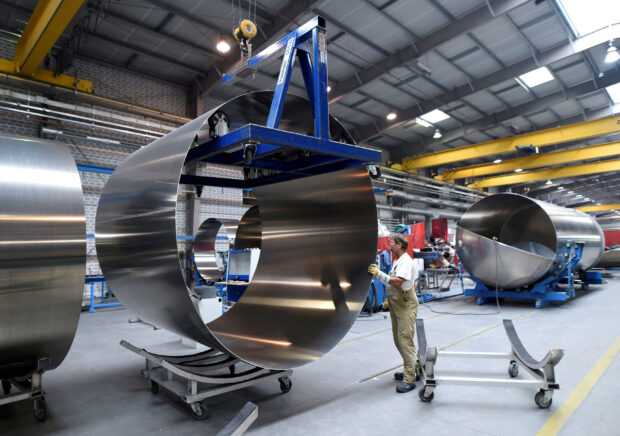German industrial output rises, exports fall in January

A worker at German manufacturer of silos and liquid tankers, Feldbinder Special Vehicles, moves rolls of aluminum at the company’s plant in Winsen, Germany. REUTERS/Fabian Bimmer/File Photo
BERLIN, Germany – German industrial production rose slightly in January even as exports fell, official data showed Monday, a sign that Europe’s top economy could be ready to turn the corner after a prolonged slump.
Industrial production rose 2 percent in January on the previous month, federal statistics agency Destatis said, with exports falling 2.5 percent over the same period.
Analysts polled by financial data firm FactSet had expected a rise of just 0.9 percent in industrial production.
READ: German industrial output fell more than expected in December
The data was an indication that Germany’s industrial slump was “bottoming out”, ING bank analyst Carsten Brzeski said.
“However, it is too early to call any substantial turnaround,” Brzeski said, pointing out that industrial production was still about 10 percent below its levels before the COVID-19 pandemic.
Production rose particularly strongly in the car, food and machine-building industries, Destatis said.
Meanwhile, the fall in exports was driven above all by declining business with other EU member-states and the United States, which last year overtook China to become Germany’s largest trading partner.
Exports could continue to struggle in the short term after US President Donald Trump said he would slap tariffs on exports from the European Union, Brzeski said.
“This is not just because of the potential impact on German exports, but more so the effect on German investments if companies were to move production to the US,” he said.
Last week, Destatis released data showing that German industrial orders — an indicator of future activity — posted their largest fall in a year.
Economists have said a proposal by the incoming German government to boost defense and infrastructure spending by hundreds of billions of euros could help revive the country’s ailing economy after months of stagnation.
Germany registered its second-straight year in recession in 2024, with GDP contracting by 0.2 percent.